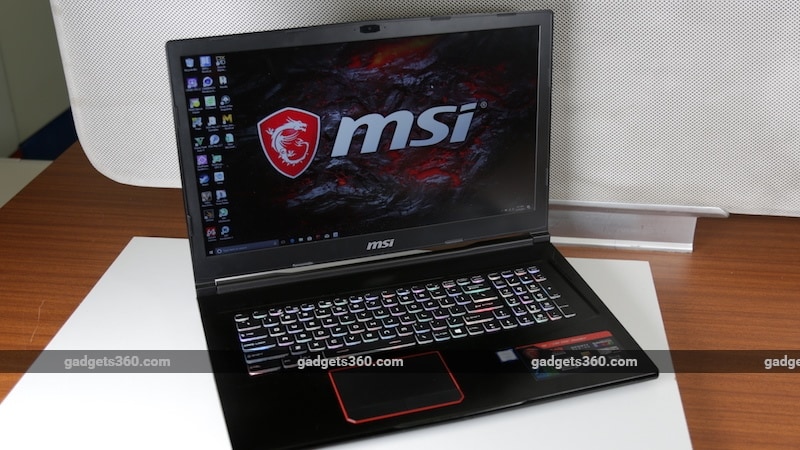
Table of Contents
ToggleHIGHLIGHTS
- The 17.3-inch display has a 120Hz refresh rate and a full-HD resolution
- Gaming performance is very good and the laptop is VR ready
- The GE73VR 7RF Raider is priced at Rs. 1,85,990
It’s been a while since we’ve tested laptops that are designed to be ‘desktop replacements’, so when MSI said it had a new 17-inch gaming model, we couldn’t help but check it out. The company has been a longstanding player in the PC components and laptop businesses, but one thing it continues to struggle with is product naming.
The model we’re testing today is called the GE73VR 7RF Raider, which is an absurd name for a product and is something no one would remember. But there is some method to this madness and if you wish to decipher how it decides on these charming names, here’s a little primer to get you started. Coming back to the laptop, the Raider boasts of a VR-ready GPU, a 120Hz display, and an RGB keyboard that’s sure to put any Christmas tree to shame. Let’s see if it’s worth the almost Rs. 2,00,000 price tag.
MSI GE73VR 7RF Raider design and build quality
The 7RF Raider is humongous so it’s not something you’ll want to lug around with you regularly. The design boasts of sharp lines and red accents, so there’s no mistaking it for a regular laptop. The metal lid has a faint brushed metal pattern that looks good when it catches the light. There’s MSI’s dragon logo on the lid too, which lights up when the laptop is powered on. The Raider isn’t very bulky but it is heavy, weighing 2.8kg. Other than the metal top and palm rest area, the rest of the body is made of plastic. Overall, the design looks good but it’s not as eye-catching as some gaming laptops by Acer and Asus.
The hinge offers good support and the lid can tilt back to about 160 degrees. There’s little flex in the lid but the metal back offers good rigidity. The 17.3-inch display has a full-HD resolution, with a refresh rate of 120Hz and a 5ms response time. Due to the size of the display, Windows 10 doesn’t need to do any scaling. There is some jaggedness around text, but overall, it’s not bad. The display runs at 120Hz at all times, and you can’t switch to a lower refresh rate. You can switch between colour profiles and fine-tune the presets as per your liking. MSI’s True Color tool also lets you set a scheduled blue light filter.

Thanks to the large footprint, there’s enough space for a good selection of physical ports. There are a total of three Type-A USB 3.0 ports, a USB Type-C port (USB 3.1, Gen2), Ethernet, HDMI, and Mini-DisplayPort, as well as an SD card reader and separate sockets for headphones and a microphone. It’s nice to see the 10Gbps USB Type-C port in particular, as most manufacturers only implement the 5Gbps USB 3.1 Gen 1 standard. However, at this price, we would have preferred to see Thunderbolt 3 here, which offers much higher bandwidth of up to 40Gbps. There’s no optical drive, not that we missed having one. One cool feature that we liked is that there are LEDs on the USB Type-A ports, so you can find them in the dark.
The metal palm rest offers good support and the trackpad is positioned well so doesn’t get in the way when typing. The full-sized keyboard from SteelSeries gets per-key RGB lighting and there’s a dedicated button on the right, which can be used to switch between different lighting profiles. The keys themselves are spaced out well and work silently. We like the fact that MSI has used individual mouse buttons for the trackpad, so you can play FPS titles without a mouse in case of gaming emergencies. The power button is placed in a cluster on the right, along with a button that pushes both exhaust fans up to full speed.

There are exhaust vents on either side and around the back for hot air, plus enormous ones on the bottom of the laptop for the intake of fresh air. You can also see four speakers on the bottom, which are part of MSI’s Dynaudio setup. The laptop has status LEDs for Wi-Fi, battery charging and hard disk activity, but you’ll most likely never see them due to their silly placement on the front, completely hidden by the lip of the laptop and only visible if you tilt the laptop upwards.
Sadly, there isn’t any easy way to access the upgradable components such as the RAM and hard drive. You’d have to open up the entire base, which would mean voiding your warranty. The laptop ships with some basic instruction leaflets and a massive 230W power adapter.
MSI GE73VR 7RF Raider specifications and software
The GE73VR 7RF Raider boasts of pretty solid specifications. The CPU is an Intel Core-i7-7700HQ, which is a proven quad-core model with HyperThreading. There’s a total of 16GB of DDR4 RAM, in the form of two 8GB modules running in a dual-channel configuration. Windows 10 is installed on a 256GB M.2 SSD while you also get a 1TB 2.5-inch mechanical drive. The latter is of the 7200rpm variety and not the typical 5400rpm, so using it for game installs shouldn’t cause a major performance bottleneck. The main ingredient of any gaming laptop is the GPU, and here, you have the onboard Intel HD Graphics 630 as well as a dedicated Nvidia GeForce GTX 1070 with 8GB of GDDR5 memory. Other specifications include an HD webcam, Bluetooth 4.1, and dual-band Wi-Fi 802.11ac by Killer Networks.
MSI preinstalls plenty of software tools for the various hardware components and customisation options available. You also get a limited time subscription to Norton Security. The Killer Wi-Fi and LAN controllers have their own utility that lets you track the amount of Internet bandwidth being used by running programs and analyse the strength of the Wi-Fi networks around you. There’s also a program by SteelSeries for customising the LEDs and setting up macros for the function (Fn) keys. However, the various options for adjusting the lighting aren’t very easy to figure out and take some getting used to. The software also has a dated look and feel to it.

Finally, we have MSI’s own program called Dragon Centre. Here, you can monitor the CPU, RAM, GPU, and hard drive usage as well as temperatures. The App Portal tab lets you add applications so you can quickly launch them from within Dragon Centre itself. The System Tuner tab is the most interesting of the lot, but we wish MSI had given better explanations as to what each of the toggles does. For instance, there are controls labelled VR Ready and also Nahimic VR, and then there are toggles for USB Boost and Storage Boost. Nothing explains what impact they actually make if you have them on or off. The Shift feature is useful in switching between Comfort, Sport and Turbo power modes, and can be accessed through the F7 button. These are only available when you’re connected to a power source. Turbo mode lets you manually bump up the GPU’s core clock and memory frequencies.

The Dragon Centre software also lets you monitor your system’s statistics and change power modes through the Dragon Dashboard app on your iPhone or Android device. It works well, provided both the laptop and the phone are connected to the same Wi-Fi network. However, we fail to see any practical use case for this, other than showing off. Overall, all the software that MSI provides lacks a sense of cohesiveness. It would have easier for users if MSI had integrated controls for the keyboard lighting, Wi-Fi and other features into its own app.
MSI GE73VR 7RF Raider performance and battery life
General performance is great, as the laptop boots quickly and runs silently with regular use such as Web browsing and watching movies. When the CPU starts to heat up a bit, only the fan on the left spins at a low speed. When gaming, the Nvidia GPU is activated, and the second exhaust fan also starts spinning as the temperature rises. The left side of the keyboard gets a bit warm and so does the bottom, but it isn’t too uncomfortable if you have the laptop on your lap. With taxing 3D games, the fans get quite noisy and need to spin furiously to keep temperatures in check. This can get quite distracting, especially if you don’t have headphones on.
Having Windows 10 and all your games rendered at 120Hz simply makes everything feel a bit snappier. Interestingly, you’re locked to 120Hz, and Nvidia’s G-Sync technology that supports a range of refresh rates isn’t supported. We like the punchy colours of the display, especially with video playback. Audio performance is pretty good too. The Raider has two 2W tweeters and two 3W woofers, that are bottom firing. This results in powerful sound, with decent performance even for low frequencies. You can tweak the sound with the Nahimic software program.

The keyboard is comfortable for typing and keys are quiet so it won’t disturb others in a room. However, the lack of a Windows key on the left drove us nuts at times, as we couldn’t perform our reflexive Windows shortcuts such as opening up Windows Explorer. The webcam produces decent quality images given enough lighting, and there’s also a trial version of TriDef SmartCam preinstalled.
Coming to the laptop’s performance, we got good numbers in the synthetic tests. PCMark 8 returned scores of 3,994, 4,916 and 3,439 points in the Home, Creative and Work test suites. In 3DMark 11’s Fire Strike Extreme test, we recorded a score of 7,586, which is very good. CPU tests showed similar performance to other laptops with the Core i7-7700HQ. SSD performance was also good, and we recorded 507MB/s (read speed) and 456MB/s (write speed) in SiSoft SANDRA’s File System Bandwidth test.
The laptop is certified as VR ready, which means you can plug in a VR headset such as the HTC Vive or the Oculus Rift and get going. There’s also TriDef VR support, which has over 900 optimised titles for VR and 3D. MSI bundles a three month subscription for it with the Raider. The GPU is clocked at 1480MHz, which is already slightly higher than Nvidia’s default frequency of 1442MHz. The laptop runs stable even with the frequencies maxed out on the available sliders. We got the GPU running at 1680MHz (from 1480MHz) and the memory at 2177MHz (from 2002MHz), which translates to an avenge increase of five to six percent in synthetic scores as well as the framerates in games. It might not seem like a lot, but it can help provide a critical boost in games that need it.

In real-world gameplay, FarCry 4 was a cakewalk for the Raider, as it easily churned out an average of 80fps, with the graphics quality cranked up all the way to the Ultra preset. Rise of the Tomb Raider delivered highly playable framerates which averaged at around 85fps. This was at the native resolution, with DirectX 12, FXAA, and the Very High preset. In the game’s built-in benchmark, we averaged 94fps.
Metro: Last Light Redux is typically one of the most stressful games on our list, but the Raider managed to tame it pretty well. With the Very High preset, we managed to average 128fps (without SSAA). However, with the latter enabled, the framerate took a serious hit and dropped to 74fps. In Deus Ex: Mankind Divided, we averaged 37fps, with 4xAA and DirectX 12 enabled.
In Grand Theft Auto V, we also got very satisfying results averaging at 58fps. This was with the all the settings bumped up to their maximum (a mix of Very High and Ultra).
However, battery life is weak, which is something we expected going in to this review. The Raider struggled to last for even an hour (51 minutes to be precise) in Battery Eater Pro, and with regular use, we managed to get only about two and half hours of runtime.
Verdict
The MSI GE73VR 7RF Raider is a very expensive laptop, andwe’d consider going the DIY desktop route with this sort of budget. Then again, you can’t exactly stuff a desktop into your backpack, and not everyone has the space, which is why such laptops exist. Looking at the competition, Dell has its Alienware 17 with a similar configuration (no 120Hz display but you do get 512GB SSD) which commands a higher price, and then there’s HP’s Omen 17-an009tx, which is priced a tad lower and features a very similar core configuration as the Raider, including the 120Hz display.
The GE73VR 7RF Raider is no doubt a powerful gaming laptop but there are certain small things we wish MSI had done better. The missing Windows key on the left can be annoying, the exhaust fans can get very loud, there’s no easy way to upgrade any components, and we wish there had been a more cohesive experience with the bundled software.
Even if you have the budget, we’d suggest checking out other options such as the Omen 17 by HP before pulling the trigger.
Price (MRP): 1,85,990
Pros
- Good gaming performance
- 120Hz display
- Per-key RGB lighting
- Good set of physical ports
- Sturdy body
Cons
- No left Windows key
- No bottom hatch for upgrades
- Loud exhaust fans when gaming
- Software experience isn’t cohesive
- Weak battery life
Ratings (Out of 5)
- Design: 3.5
- Display: 4
- Performance: 4.5
- Software: 3.5
- Value for Money: 3
- Overall: 3.5
[“Source-gadgets.ndtv”]
| M | T | W | T | F | S | S |
|---|---|---|---|---|---|---|
| 1 | 2 | 3 | 4 | 5 | 6 | |
| 7 | 8 | 9 | 10 | 11 | 12 | 13 |
| 14 | 15 | 16 | 17 | 18 | 19 | 20 |
| 21 | 22 | 23 | 24 | 25 | 26 | 27 |
| 28 | 29 | 30 | 31 | |||



























